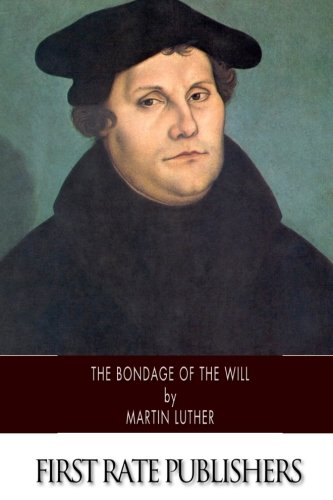A Brief Book Summary from Books At a Glance
Editor’s Note: In honor of this “Reformation 500” anniversary year Books At a Glance is featuring a number of historic works of Reformation interest. This week we are happy to present a summary of Martin Luther’s massively important work, The Bondage of the Will.
Introduction
Martin Luther’s The Bondage of the Will (De Servo Arbitrio, 1525) is one of the most influential theological treatises of the Reformation. It sets out Luther’s view of free will and divine sovereignty. Luther writes to respond to Erasmus’ writings on free will, and his style is vigorous and intense. This book is well worth reading for its historical value alone. Anyone interested in theology should read this seminal work.
Table of Contents
Chapter 1 Introduction
Chapter 2 Review of Erasmus’ Preface
Chapter 3 Review of Erasmus’ Introduction
Chapter 4 Review of Erasmus’ Arguments for “Free-Will”
Chapter 5 Review of Erasmus’ Treatment of Texts that Deny “Free-Will” (I)
Chapter 6 Review of Erasmus’ Treatment of Texts that Deny “Free-Will” (II)
Chapter 7 The Bible Doctrine of the Bondage of the Will
Chapter 8 Conclusion
Summary
Chapters 1 & 2- Introduction & Review of Erasmus’ Preface
Erasmus is an eloquent intellectual, but his book on free will is rubbish. Scripture and reason entirely refute Erasmus’ claims. Given Erasmus’ stature, the fact that his book on free will is so poor proves that free will theology is bankrupt. Erasmus asserts that he would prefer to be skeptical on these issues, but he submits to the authority of Scripture and the church. Yet we cannot be skeptical about what God has revealed clearly, nor can we dare see the church as an authority equal to Scripture. We must follow God, not doubt his Word. The Holy Spirit is not a skeptic, and he teaches us the truth in certainty and clarity. Scripture is perspicuous, and Christ is the center of the Word. God has shed his light so that even obscure passages can be understood in light of the whole, connected to Christ. Scripture tells us of mysteries like the incarnation and Trinity—it does not satisfy all of our idle curiosity and speculative desires, but it does clearly teach us that these things are true. God’s Spirit is needed for understanding Scripture, since the human heart is dark and we are willfully blind to the light.
Erasmus has said that issues of free will are not that important, but why then does he write about it? Considering how much theology and human experience is bound up with issues of free will and God’s sovereignty, if it’s not important, what is? The relationship of our will and the grace of God is essential, not non-essential. It is essential for people to know what they can or can’t do when it comes to their eternal salvation and righteous living. This is the hinge: what does our will do in salvation? Our understanding of these matters affects our view of God’s grace, our worship, and our living. Free will and divine foreknowledge are so related that a particular view of one necessitates a particular view of the other. If God foreknows with logical necessity, then we do not have libertarian free will. If God’s foreknowledge is not contingent, then free will is exploded. God’s foreknowledge is eternal and immutable, and his predestination stands. Scripture teaches these truths, and they are helpful for us to know so that we understand who God is and what he has done.
Erasmus contends that some things should not be taught openly, but this is wrong when it comes to the Bible: everything God has said is to be taught. Sophists have long cavilled at biblical doctrines and tried to make them absurd, but their wickedness and foolish objections should not keep us from teaching the truth of God. Biblical teaching can be distorted and abused, but the solution isn’t neglect, it is to set things out properly. If we lose the Word then we lose the knowledge of Christ and salvation. Only God’s Word is the ultimate authority—if popes and others place their teaching on par with it (or above it) then they are on Satan’s side. We must not forbid people the study of the Word, and the Word will not be bound. God has ordained that his gospel be taught to all people in all places. Church councils have erred, and this fact should not be hidden. Erasmus worries that teaching about God’s foreknowledge and sovereignty will cause people to. . .
[To continue reading this summary, please see below....]The remainder of this article is premium content. Become a member to continue reading.
Already have an account? Sign In
